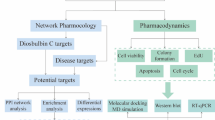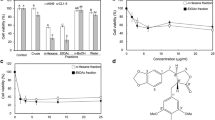Abstract
Non-small cell lung cancer (NSCLC) constitutes nearly 85% of all cases of lung cancer. Drug resistance, dose-limiting toxicity, and metastasis in NSCLC eventually reduce the efficacy of chemotherapeutics. In this study, we have shown that the methanol-ethyl acetate partitioned fraction from Magnolia grandiflora L. seeds (MEM) exhibit potential anti-cancer activities against NSCLC H1975 cells in vivo and in vitro. MEM significantly inhibited the proliferation of H1975 cells in a concentration- and time-dependent manner. Further, MEM exhibited potent anti-tumor efficacy and low toxicity in nude mice bearing H1975 tumors. Our study also showed that MEM could induce cellular apoptosis in H1975 cells by down-regulating the protein expression levels of Akt and p-Akt-473, and by increasing the ratio of Bax/Bcl-2. Also, MEM significantly inhibited metastasis-related cell invasion and migration of H1975 cells, which associated with the down-regulation of HIF-1α, MMP-2, and MMP-9 protein expression levels. Thus, our data shows that MEM may be an effective fraction of M. grandiflora in NSCLC treatment.




Similar content being viewed by others
References
Baek SH, Ko JH, Lee JH, Kim C, Lee H, Nam D, Lee J, Lee SG, Yang WM, Um JY, Sethi G, Ahn KS (2017) Ginkgolic acid inhibits invasion and migration and TGF-induced EMT of lung cancer cells through PI3K/Akt/mTOR inactivation. J Cell Physiol 232(2):346–354
Bray F, Jemal A, Grey N, Ferlay J, Forman D (2012) Global cancer transitions according to the human development index (2008–2030): a population-based study. Lancet Oncol 13(8):790–801
Carrara L, Lavezzi SM, Borella E, De Nicolao G, Magni P, Poggesi I (2017) Current mathematical models for cancer drug discovery. Expert Opin Drug Discov 12(8):785–799
Chang YC, Chan YC, Chang WM, Lin YF, Yang CJ, Su CY, Huang MS, Wu ATH, Hsiao M (2017) Feedback regulation of ALDOA activates the HIF-1α/MMP9 axis to Q7 promote lung cancer progression. Cancer Lett 403:28–36
Chao J, Dai Y, Verpoorte R, Lam W, Cheng YC, Pao LH, Zhang W, Chen S (2017) Major achievements of evidence-based traditional Chinese medicine in treating major diseases. Biochem Pharmacol 139:94–104
Cheng TC, Din ZH, Su JH, Wu YJ, Liu CI (2017) Sinulariolide suppresses cell migration and invasion by inhibiting matrix metalloproteinase-2/-9 and urokinase through the PI3K/AKT/mTOR signaling pathway in human bladder cancer cells. Mar Drugs 15(8):238
Farag MA, Al-Mahdy DA (2013) Comparative study of the chemical composition and biological activities of Magnolia grandiflora and Magnolia virginiana flower essential oils. Nat Prod Res 27(12):1091–1097
Feltenstein MW, Schühly W, Warnick JE, Fischer NH, Sufka KJ (2004) Anti-inflammatory and anti-hyperalgesic effects of sesquiterpene lactones from Magnolia and Bear’s Foot. Pharmacol Biochem Behav 79(2):299–302
Guo H, German P, Bai S, Barnes S, Guo W, Qi X, Lou H, Liang J, Jonasch E, Mills GB, Ding Z (2015) The PI3K/AKT pathway and renal cell carcinoma. J Genet Genomics 42(7):343–353
Hers I, Vincent EE, Tavaré JM (2011) Akt signalling in health and disease. Cell Signal 23(10):1515–1527
Jackman D, Pao W, Riely GJ, Engelman JA, Kris MG, Jänne PA, Lynch T, Johnson BE, Miller VA (2010) Clinical definition of acquired resistance to epidermal growth factor receptor tyrosine kinase inhibitors in non-small-cell lung cancer. J Clin Oncol 28(2):357–360
Jemal A, Bray F, Center MM, Ferlay J, Ward E, Forman D (2011) Global cancer statistics. CA Cancer J Clin 61(2):69–90
Kar S, Palit S, Ball WB, Das PK (2012) Carnosic acid modulates Akt/IKK/NF-κB signaling by PP2A and induces intrinsic and extrinsic pathway mediated apoptosis in human prostate carcinoma PC-3 cells. Apoptosis 17(7):735–747
Kumar D, Haldar S, Gorain M, Kumar S, Mulani FA, Yadav AS, Miele L, Thulasiram HV, Kundu GC (2018) Epoxyazadiradione suppresses breast tumor growth through mitochondrial depolarization and caspase-dependent apoptosis by targeting PI3K/Akt pathway. BMC Cancer 18(1):52
Li HM, Zhao SR, Huo Q, Ma T, Liu H, Lee JK, Hong YS, Wu CZ (2015) A new dimeric neolignan from Magnolia grandiflora L. seeds. Arch Pharm Res 38(6):1066–1071
Lu X, Yu L, Zhang Z, Ren X, Smaill JB, Ding K (2018) Targeting EGFR (L858R/T790M) and EGFR (L858R/T790M/ C797S) resistance mutations in NSCLC: current development in medicinal chemistry. Med Res Rev 38:1550–1581
Lynch TJ, Adjei AA, Bunn PA Jr, Eisen TG, Engelman J, Goss GD, Haber DA, Heymach JV, Jänne PA, Johnson BE, Johnson DH, Lilenbaum RC, Meyerson M, Sandler AB, Sequist LV, Settleman J, Wong KK, Hart CS (2006) Summary statement: novel agents in the treatment of lung cancer: advances in epidermal growth factor receptor-targeted agents. Clin Cancer Res 12:4365–4371
Manning BD, Cantley LC (2007) AKT/PKB signaling: navigating downstream. Cell 129(7):1261–1274
Manning BD, Toker A (2017) AKT/PKB Signaling: Navigating the Network. Cell 169(3):381–405
Marin GH, Mansilla E (2010) Apoptosis induced by Magnolia Grandiflora extract in chlorambucil- resistant B-chronic lymphocytic leukemia cells. J Cancer Res Ther 6(4):463–465
Mehlen P, Puisieux A (2006) Metastasis: a question of life or death. Nat Rev Cancer 6(6):449–458
Mitsudomi T, Morita S, Yatabe Y, Negoro S, Okamoto I, Tsurutani J, Seto T, Satouchi M, Tada H, Hirashima T, Asami K, Katakami N, Takada M, Yoshioka H, Shibata K, Kudoh S, Shimizu E, Saito H, Toyooka S, Nakagawa K, Fukuoka M, West Japan Oncology Group (2010) Gefitinib versus cisplatin plus docetaxel in patients with non-small-cell lung cancer harbouring mutations of the epidermal growth factor receptor (WJTOG3405): an open label, randomised phase 3 trial. Lancer Oncol 11(2):121–128
Mohamed SM, Hassan EM, Ibrahim NA (2010) Cytotoxic and antiviral activities of aporphine alkaloids of Magnolia grandiflora L. Nat Prod Res 24(15):1395–1402
Schühly W, Khan I, Fischer NH (2001) The ethnomedical user of Magnoliaceae from the Southeastern United States as leads in drug discovery. Pharm Biol 39:63–69
Schuurbiers OC, Kaanders JH, van der Heijden HF, Dekhuijzen RP, Oyen WJ, Bussink J (2009) The PI3-K/AKT-pathway and radiation resistance mechanisms in non-small cell lung cancer. J Thorac Oncol 4(6):761–767
Stone R (2008) Biochemistry: Lifting the veilon traditional Chinese medicine. Science 319(5864):709–710
Wu SH, Hsiao YT, Kuo CL, Yu FS, Hsu SC, Wu PP, Chen JC, Hsia TC, Liu HC, Hsu WH, Chung JG (2015) Bufalin inhibits NCI-H460 human lung cancer cell metastasis in vitro by inhibiting MAPKs, MMPs, and NF-κB pathways. Am J Chin Med 43(6):1247–1264
Xie Q, Wen H, Zhang Q, Zhou W, Lin X, Xie D, Liu Y (2017) Inhibiting PI3K-AKt signaling pathway is involved in antitumor effects of ginsenoside Rg3 in lung cancer cell. Biomed Pharmacother 85:16–21
Xu Z, Zhang F, Zhu Y, Liu F, Chen X, Wei L, Zhang N, Zhou Q, Zhong H, Yao C, Zhu X, Gong C, Zhu S, Zou C (2019) Traditional Chinese medicine Ze-Qi-Tang formula inhibit growth of non-small-cell lung cancer cells through the p53 pathway. J Ethnopharmacol 234:180–188
Yamaguchi H, Wang HG (2001) The protein kinase PKB/Akt regulates cell survival and apoptosis by inhibiting Bax conformational change. Oncogene 20(53):7779–7786
Zhou F, Du J, Wang J (2017) Albendazole inhibits HIF-1α-dependent glycolysis and VEGF expression in non-small cell lung cancer cells. Mol Cell Biochem 428(1–2):171–178
Zhou H, Li XM, Meinkoth J, Pittman RN (2000) Akt regulates cell survival and apoptosis at a postmitochondrial level. J Cell Biol 151(3):483–494
Acknowledgements
This work was financially supported by the Education Department of Anhui Natural Science Research Project China under Grant (KJ2018A0232, KJ2019A0326); the Foundation of Bengbu Medical College (Byycx1911).
Author information
Authors and Affiliations
Corresponding author
Ethics declarations
Conflict of interest
All authors have no conflict of interest to declare.
Additional information
Publisher’s note
Springer Nature remains neutral with regard to jurisdictional claims in published maps and institutional affiliations.
Electronic supplementary material
ESM 1
(DOCX 271 kb)
Rights and permissions
About this article
Cite this article
Ma, H., Bai, X., Sun, X. et al. Anti-cancer effects of methanol-ethyl acetate partitioned fraction from Magnolia grandiflora in human non-small cell lung cancer H1975 cells. J Bioenerg Biomembr 52, 175–183 (2020). https://doi.org/10.1007/s10863-020-09828-6
Received:
Accepted:
Published:
Issue Date:
DOI: https://doi.org/10.1007/s10863-020-09828-6




